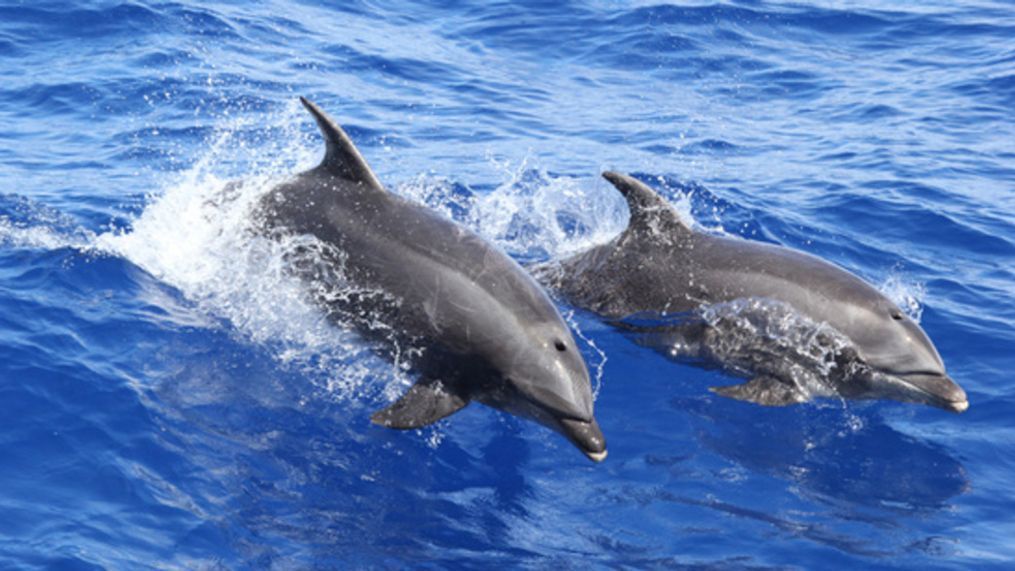"Cute" dolphin video actually a dangerous behavior, sign of illegal feeding, experts say

CHARLESTON, S.C. (WCIV) — A video shared by ABC News 4 showing a dolphin’s seemingly playful interaction with a group of fishermen may have been adorable, but wildlife experts say the encounter wasn’t a positive one.
The video, taken by a man fishing with his grandson in the Wando River, shows the dolphin within feet of the fishermen’s idling boat, splashing and bobbing in the water while looking directly at the people on board.
Local marine scientists say the dolphin’s behavior wasn’t simply playful, inquisitive antics; rather, they say the dolphin was begging for food.
“That is not normal wild dolphin behavior,” said Meghan Galipeau, a dolphin researcher with the S.C. Aquarium. “That is a result of the dolphin being fed before, and learning to associate people and boats with food.”
Ordinarily, wild dolphins wouldn’t directly interact with people the way the dolphin in the video did, according to Galipeau.
Instead, she says wild dolphins may approach a boat to investigate, but aren’t going to hang around it for long.
“A dolphin that is not habituated is not going to hang around much, especially boats,” Galipeau says. “They may swim by at a close distance, just to sort of look at you, but then will leave you alone."
It’s when dolphins learn they can get food from a boat that problems arise. The behavior poses potential dangers for both people and dolphins, says Wayne McFee, a dolphin specialist for the National Oceanic and Atmospheric Administration (NOAA).
“Think of it as a bear situation,” says McFee. “You don’t want to feed a bear, because they keep coming back to you. This is no different.”
McFee and Galipeau say dolphins, while charismatic and entertaining to watch, are still large, powerful, wild and unpredictable predators that can and have injured people in the past.
McFee and Galipeau say dolphins that come to boats for food may turn aggressive if they don’t get what they want, which is why one thing shown in the video is so worrisome to them. No one appears to feed the animal, but a person is seen reaching their hand overboard toward the dolphin.
“That’s exactly how people get bit,” McFee said. “When those dolphins don’t get what they want, they’ll go after your hands.”
“That’s 100 sharp teeth biting you,” Galipeau added.
The dolphins also face a variety of dangers because of such encounters, Galipeau says. For one, she says the dolphins aren’t looking for their own predators while they’re fixated on the boats and the potential easy meal.
Another issue is if people do feed the animals, the food itself could harm the dolphins. McFee says there are documented cases of people giving the dolphins potato chips, hotdogs, and even beer. Feeding them unnatural items, he says, could lead to illness or death.
“There’s nothing we can give them from our boat that is good for them, not even fish,” says Galipeau. “Even the fish could be spoiled if it’s been sitting out on your boat.”
The boats themselves pose several other risks to the dolphins, scientists says. Dolphins that are accustomed to approaching boats may be more likely to be hit by boats, and suffer potentially deadly injuries.
“People don’t think of dolphins as being vulnerable to boat strikes like manatees, but they are,” says Galipeau.
“We do get boat strikes on occasion, and most of those are fatal,” added McFee, who says boat strikes are the second leading type of negative human-dolphin encounters in the Lowcountry, behind crab pot entanglements.
Perhaps worst of all, when dolphins learn to associate people and boats with food, they teach that to other dolphins, perpetuating all these other problems, scientists say.
Fortunately, dolphins begging for food is not a learned behavior that’s prevalent in the Lowcountry, McFee says. Both he and Galipeau would like it to stay that way.
To accomplish that, the scientists say the best things people can do is to keep a safe distance from dolphins (at least 50 yards), and never feed them.
Feeding not only leads to the problems detailed above, but is illegal under the federal Marine Mammals Protection Act. Touching dolphins, harassing them, or attempting to do these things is also illegal.
But what if a dolphin approaches your boat begging for food? McFee and Gallipeau say the best thing you can do is ignore them. If they won’t go away, move along.
“I can definitely acknowledge how hard it is when a dolphin comes up to your boat, you want to interact with it, but the best thing you can do is slowly move away and don’t give it any attention,” Galipeau says. "If you really care about these animals, admire them from a safe distance, and give them respect as large predatory wild animals.”
For more details on how to behave around wild dolphins, CLICK HERE.
To report feeding or harassment of wild dolphins, call the NOAA Fisheries Southeast Enforcement Division at: 1-800-853-1964.
To report an injured or entangled dolphin, or other wildlife, call the Florida Fish and Wildlife Conservation Commission at: 1-888-404-FWCC (3922).
